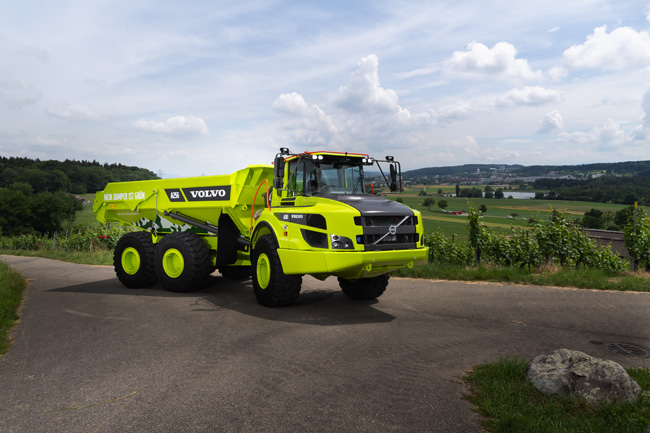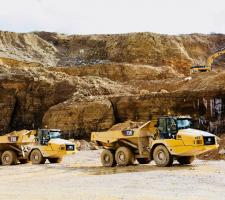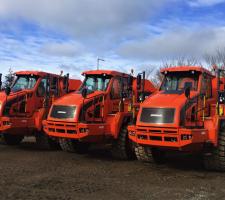
All Volvo’s articulated haulers are now made at a plant powered entirely by renewable energy. Liam McLoughlin reports.
With quarrying operators increasingly making efforts to preserve the environment, Swiss
The package includes a carbon offset certificate from Swiss climate protection foundation Fair Recycling. The certificate covers the transport of the machine from Braås to the jobsite of the customer’s choice, plus a certain number of operating hours. ‘GoGreen’ also includes a warranty extension and a selection of service options.
All of Volvo’s articulated haulers – from the 25-tonne capacity A25G to the gigantic 55-tonne A60H – are produced at the Braås site, which opened in 2014.
The first Volvo ‘GoGreen’ articulated hauler, an A25G, has now rolled off the production line in Braås and made its way to the Robert Aebi headquarters in Regensdorf, outside Zürich. Robert Aebi says the journey was “practically carbon neutral”.
To signify their climate-conscious credentials, articulated haulers sold with the ‘GoGreen’ package will feature a special decal reading ‘My hauler is green’ in German, French or Italian – according to customer preference – above an endorsement from Fair Recycling. The entire machine can also be painted green on request.
“Our customers are not only looking for machines that are quieter, more economical and more efficient; they also want us to take responsibility for the world around us,” says Roger Schenk, business unit leader for construction at Robert Aebi. “A certain amount of carbon emissions is still unavoidable in today’s construction industry – even with the latest technology – but there are things we can do to help.”
Robert Aebi has signed a three-year agreement with Fair Recycling as part of its move to become more engaged in climate and environmental issues. A refrigerator will be recycled with each ‘GoGreen’ carbon certificate that Fair Recycling issues. Fair Recycling works to combine education with the practical recycling of refrigerators containing harming CFC greenhouse gases. Each refrigerator recycled under the agreement will recover approximately 50kg of raw materials and save the equivalent of a tonne of CO2.
“Environmental care and sustainability are components of a journey that always has new goals to reach,” says Schenk. “We at Robert Aebi would like to make a contribution through our agreement with Fair Recycling to a cleaner future.”
Meanwhile, manufacturing giant
The redesign introduces improved operator stations including new controls, transmission-protection features, new hoist-assist system, advanced traction control system, new stability-assist system, and a fuel-saving ECO operating mode.
In addition, Cat says the design of the 730 and 730 EJ has been enhanced with automatic retarder control and a hill-start feature. The 735 retains these features from its C-Series predecessor and further incorporates significant design refinements that include a new Cat C13 ACERT engine, Cat CX31 transmission (also on the 730 and 730 EJ) and structural and dimensional modifications said to reduce empty weight by 22%, while retaining the productivity of the outgoing 735C. These features combine for a claimed gain in fuel efficiency of up to 19%.
The cab’s new external ‘spinal-ROPS’ [rollover protection structure] design incorporates a rear-quarter glass that eliminates a structural pillar in the C-Series design, for enhanced rear visibility. There is also a new ‘wake-up’ feature that initiates the machine’s displays when the door is opened. The door is of a lighter, stronger design with a shut-assist feature for improved sealing against dust infiltration. Cat says the overall cab design results in lower inside sound levels at 72 dB(A), a 7 dB(A) reduction compared to previous models.
Optional new infrared glass reduces solar heating inside the cab and left- and right-hand sliding windows increase ventilation and facilitate communication with workers and the loading-vehicle operator. A new, automatic climate-control (HVAC) system positions more vents above and behind the operator for increased heating and cooling efficiency. A new heated/cooled seat is designed to give operators increased adjustments that allow ‘dialing in’ personal-comfort settings, while the passenger seat has a flip up/down design and added cushioning.
For added safety, a new lighting system, controlled via a ground-level switch, illuminates the cab’s entry steps and hitch area. Optional integrated payload lights provide an external indication of pay-load levels for the loader operator. Optional long-range, LED work lights improve visibility at night or in situations of lower visibility. New cab-mounted mirrors, including a front-visibility mirror, enhance all-around visibility for the operator. Exterior cab features include an improved flexible lower fender and a low-profile exhaust stack that need not be removed for transport.
The optional Cat Connect PAYLOAD technology calculates payload via sensors on the walking-beam suspension, and load-status lights at all four corners of the cab roof ensure visibility to the loader operator from any angle.
The new 735 replaces the 329kW Cat C15 ACERT engine with the 319kW Cat C13 ACERT. The new 730 and 730 EJ continue to use the 274kW-rated Cat C13 ACERT engine. The C13 engine used in all the new trucks is available in configurations to meet emissions standards of both highly-regulated and lesser-regulated countries.
The 730 EJ is designed to eject loads while travelling, providing positive dumping of the entire load, and also to work in areas with overhead restrictions and with soft underfoot conditions with improved machine stability.
RJT Excavations (RJT), based at Jedburgh in Scotland, has purchased three new
Prior to placing the DA30 order, RJT assistant plant manager Euan Heard and the site team from RJT carried out extensive trials both at Doosan’s proving ground in the Czech Republic and on their site in the UK.
As with all Doosan ADTs, the DA30 features an articulation hinge positioned behind the turning ring to provide equal weight distribution to the front axle even during maximum steer articulation. Together with a free-swinging rear tandem bogie, Doosan says this ensures equal distribution of weight to each wheel and guarantees permanent six-w heel contact and drive for equal power distribution and excellent traction on difficult terrain. The manufacturer adds that, collectively, the forward turning point, the unique tandem bogie and the sloping rear frame result in strong rough and soft terrain capabilities and avoid the need for electronic aids such as traction control.
It is the first time RJT has purchased a Doosan product and before doing so they tested the DA30 against all the competitors in the market on the same site. The tests were conducted in challenging and varied ground conditions matching the expected environment that they will be required to operate in.
Kim Dudley, Doosan Northern Europe region manager, commented: “RJT’s on-site team has nothing but positive feedback on the build quality, load capacity, traction in poor conditions, operator comfort, manoeuvrability and fast cycle times offered by the DA30 ADTs.”
















